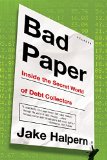Summary | Excerpt | Reviews | Beyond the Book | Readalikes | Genres & Themes | Author Bio

Critics' Opinion:
Readers' Opinion:
First Published:
Oct 2014, 256 pages
Paperback:
Oct 2015, 256 pages
 Book Reviewed by:
Book Reviewed by:
Sinéad Fitzgibbon
Buy This Book
As permissive as Herb could be, he was—in other, important ways—quite overbearing. According to Shana, Herb "had grandiose ideas of what my brother would be" and this weighed on Aaron "terribly." Aaron understood his father's expectations implicitly. In Herb's view, says Aaron, people were either "losers" or "very successful"—and it was always based on how much money they made. Herb's hopes may have weighed heavily on his son, but Herb shrugged this off as inevitable. As Herb told me, "Look, when you come from a family like ours, you're always going to be striving. You're going to want to do something better than your father. I think that goes with the territory."
For Aaron, the collections industry offered both financial reward and voyeuristic access to the city's seedier side. According to Rob, Aaron's floor manager at the agency, his boss was both fascinated and repulsed by the business: "Where Aaron came from, with a private high school and prestigious family, that was a different world. He liked this scene, in a way. You know how opposites attract? You know, you have the good girl dating the bad biker dude—she is intrigued. Maybe he was like that." Even so, Rob added, "when he had a chance not to get his hands dirty anymore, he took that route."
Aaron's chance, it turns out, came with the realization that he didn't have to operate a collection agency himself. Instead, he could buy portfolios of debt and then place them at other agencies, which would collect on the debt for him. These agencies would operate on a "contingency basis," keeping a percentage of whatever they collected. From Rob's perspective, Aaron's decision made sense. "When he saw the potential in debt buying—where he could avoid lawsuits, avoid dealing with collectors and the bullshit that comes with that—he thought, I can make just as much buying and selling. It has to do with his personality. Instead of cleaning his house, he would rather hire a maid."
Aaron's plan appeared to be a smart one. His connections and experience as a banker in Manhattan—combined with his real-life experiences in the trenches of Buffalo—would make him uniquely qualified for this new venture. In the language of the collections industry, Aaron would operate as a "privately financed debt buyer." A 2010 report by the Legal Aid Society and several other nonprofits speculates that there are roughly five hundred such buyers in the United States and concludes that little is known about how they operate. This often works out well for the buyers. After all, it is much easier to operate with minimal public scrutiny. An investment banker at one of the big Wall Street houses told me that he could never invest in "distressed consumer debt" because ever since his firm's government bailout, its unofficial motto has been, "We cannot fuck the American taxpayer." He had to run all of his deals by the PR department; thus, even if he could make a killing on an investment involving consumer debt, the PR people would likely say no.
There have been privately financed debt buyers operating in the United States since well before the Civil War. At that time, there was no uniform paper currency and if you wanted to buy a piece of property, say—and didn't have the money—you could simply write a promissory note. In fact, this is precisely what Abraham Lincoln did in 1833 when he acquired a general store from a man named Reuben Radford. In financing this purchase, he signed a promissory note to Radford for $379.82. The business fared poorly and when Lincoln proved unable to repay what he had borrowed, Radford sold his promissory note—which was merely a piece of "paper"—to the debt buyer Peter Van Bergen. Van Bergen then successfully sued Lincoln, ultimately prompting a sheriff to seize and auction off Lincoln's surveying tools, saddle, and bridle. Years later, Lincoln effectively switched sides and spent much of his legal career suing debtors on behalf of clients large and small. He also worked on the side for the equivalent of a credit bureau, providing information on the financial soundness of merchants and others in the community. As James Cornelius, the curator of the Lincoln Presidential Library and Museum, put it: "He ratted out his friends."
Excerpted from Bad Paper by Jake Halpern. Copyright © 2014 by Jake Halpern. Excerpted by permission of Farrar, Straus & Giroux. All rights reserved. No part of this excerpt may be reproduced or reprinted without permission in writing from the publisher.





The Flower Sisters
by Michelle Collins Anderson
From the new Fannie Flagg of the Ozarks, a richly-woven story of family, forgiveness, and reinvention.

The House on Biscayne Bay
by Chanel Cleeton
As death stalks a gothic mansion in Miami, the lives of two women intertwine as the past and present collide.

The Funeral Cryer by Wenyan Lu
Debut novelist Wenyan Lu brings us this witty yet profound story about one woman's midlife reawakening in contemporary rural China.
Your guide toexceptional books
BookBrowse seeks out and recommends the best in contemporary fiction and nonfiction—books that not only engage and entertain but also deepen our understanding of ourselves and the world around us.